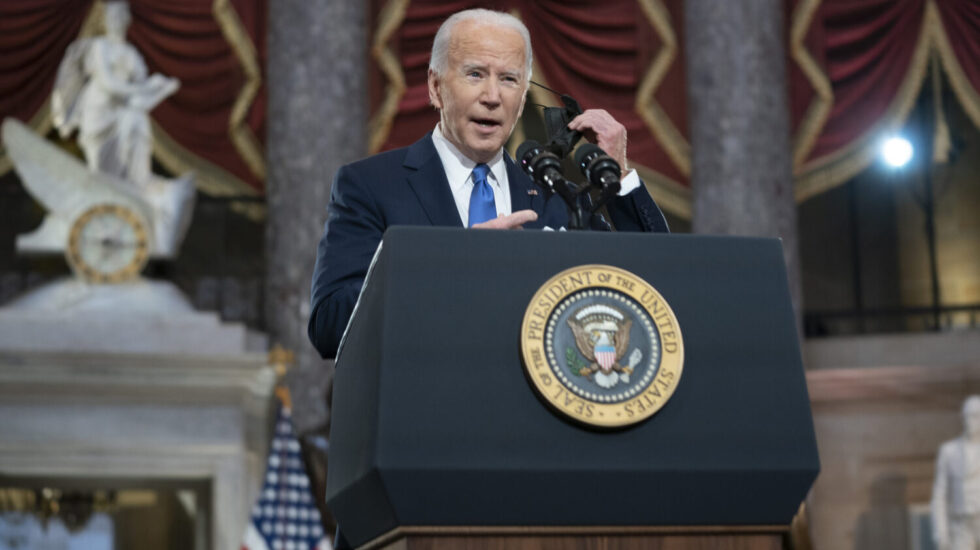President Joe Biden made a forceful case for voting rights on Tuesday and challenged the U.S. Senate to pass legislation that protects access to the ballot, even if that means temporarily lifting the filibuster.
“Will we choose democracy over autocracy, light over shadows, justice over injustice? I know where I stand. I will not yield. I will not flinch,” Biden told a crowd assembled at the Atlanta University Center Consortium, a space shared by two historically Black colleges, Clark Atlanta University and Morehouse College.
“I will the defend your right to vote, our democracy against all enemies foreign and yes domestic.” he added. “The question is where will the institution of United States Senate stand?”
Biden chastised Republican lawmakers who think “too many people voting in a democracy is a problem.” He repeatedly attacked former President Donald Trump for spreading conspiracy theories about the 2020 election, although he did not explicitly name his predecessor.
“The goal of the former president and his allies is to disenfranchise anyone who votes against them. Simple as that. The facts don’t matter. Your vote won’t matter,” he warned.
Biden also highlighted a rash of new provisions adopted by GOP-run statehouses across the country that he says will erode democracy, particularly in Georgia.
“Their end game: to turn the will of the voters to a mere suggestion,” Biden said.
“Jim Crow 2.0 is about voter suppression and election subversion… it’s about making it harder to vote and who gets to count the votes,” Biden added.
Biden said the filibuster must be temporarily eliminated if Republicans in the upper chamber are unwilling to strengthen voting rights. He said it has been “abused” to block civil right.
“To protect our democracy, I support changing our Senate rules,” the president declared. He noted that simple majorities can change voting laws in individuals states and that the U.S. Senate should have a similar dynamic.
The Washington Post provides important context on the two bills Biden touted in his speech:
The Democratic efforts are focused on two bills: the John Lewis Voting Rights Advancement Act, which would restore the federal government’s authority to review certain state voting laws to prevent discrimination, and the Freedom to Vote Act, a broader bill that would create national rules for voting by mail, early voting and other parts of the electoral process.
Senate Majority Leader Charles E. Schumer (D-N.Y.) plans to ultimately bring a package of rules changes to the floor before Martin Luther King Jr. Day. On Tuesday, Schumer warned that the threats of voter suppression are not false, as Senate Republicans have claimed, but dangerous, and he indicated that Senate action could come as early as Wednesday.
The effort, Schumer said, is to stop “these awful and nasty laws from being implemented” in the states.
However, any potential rules changes would need the support of all 50 Democratic Senators and centrists Sens. Joe Manchin of West Virginia and Kyrsten Sinema of Arizona have signaled that they’re not on board.
“Getting rid of the filibuster does not make [the Senate] work better,” Machin said to reporters on Tuesday.
But in his speech, Biden indicated that an official vote is much different than expressing an opinion to the media.
“Every member of the US Congress and Senate will have to declare where they stand – not for the moment, but for the ages,” he said.
“I ask every elected official in America,” Biden said. “Do you want to be on the side of Dr. King or George Wallace? Do you want to be on the side of John Lewis, or Bull Connor?” He noted that Republic stalwarts like Richard Nixon, Gerald Ford, and George W. Bush expanded voting rights.
Earlier in the day, Biden visited Ebenezer Baptist Church in Atlanta, where Martin Luther King Jr. was co-pastor in the 1960s. Sen. Raphael Warnock, the church’s current pastor, gave Biden and Vice President Kamala Harris a brief tour of the historic site.
The visit to Ebenezer Baptist was part of a day heavy on symbolism. Before Biden spoke, Harris addressed the crowd at the Atlanta University Center Consortium and noted that MLK’s birthday is just a few days away. The Biden administration chose to speak at the consortium, she explained, because it sits in the district once represented by the late Rep. John Lewis, a leading voting rights activist.
Despite Biden’s renewed emphasis on voting rights, many activists believe it is too little, too late. “Exasperation among voting rights groups has been building for months, as 19 states passed 34 new laws creating new restrictions on voting. One of the most sweeping new laws was signed in Georgia nearly 10 months ago,” The New York Times explains.
“When you’re diagnosed with cancer, you don’t wait a year to start treatment,” said Ian Bassin, executive director of Protect Democracy, to The Times.
“We’re beyond speeches. At this point, what we need, what we are demanding, is federal legislation,” added LaTosha Brown, co-founder of Black Votes Matter.



